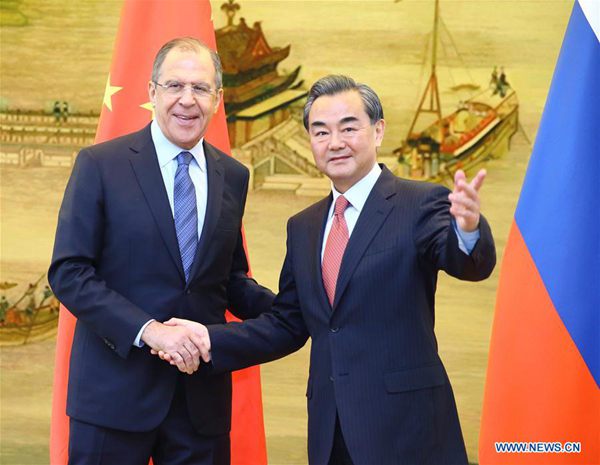


Chinese Foreign Minister Wang Yi (R) holds talks with Russian Foreign Minister Sergey Lavrov in Beijing, capital of China, April 29, 2016. (Xinhua/Ding Haitao)
Beijing and Moscow urge Washington against starting deployment in the Republic of Korea
China and Russia sent strong signals to the United States on Friday, urging it not to deploy a new anti-missile system in the Republic of Korea.
"We are expressing serious concerns in regard to the US intention to deploy the THAAD system in the ROK," Foreign Minister Wang Yi told reporters at a joint news conference with his Russian counterpart Sergei Lavrov.
"This move goes far beyond actual defense necessities and damages the strategic security of China and Russia."
The US and ROK began talks on possible deployment of the Terminal High Altitude Area Defense system after the Democratic People's Republic of Korea conducted its fourth nuclear test in January.
However, China firmly opposes the move, with analysts saying the system could be used to monitor Beijing's missile launches as far inland as Xi'an in the northwest of the country.
Lavrov said countries involved "shouldn't use Pyongyang's acts as a pretext to increase their military presence on the Korean Peninsula. We believe the possible deployment of the THAAD anti-missile system won't resolve this problem."
Wang said the possible deployment only "adds fuel to the fire of an already tense situation and even possibly wrecks the regional strategic balance".
Last week, Sung Kim, the US special representative for DPRK policy, said China and Russia do not need to be concerned about THAAD. It is "a complete defense system" to protect the US and ROK "against missile threats from Pyongyang".
He made the comments after "productive discussions" in Beijing with Wu Dawei, China's special representative on Korean peninsula affairs.
Zuo Xiying, an international studies specialist at Renmin University of China's National Academy of Development and Strategy, denounced Kim's comments.
Zuo said THAAD is called a "defense system" but its capacity passes way beyond the need to safeguard against missile threats from Pyongyang and its radar could be used to collect surveillance data far inland in both China and Russia.
"This poses a threat to China and Russia's national security, and the deployment will definitely harm regional peace and stability," Zuo said.
Lavrov also said on Friday that one of his most important tasks is to prepare for Russian President Vladimir Putin's visit to Beijing in June. Lavrov discussed the visit with President Xi Jinping and Wang during their meeting on Thursday and Xi told him that China hopes for new agreements with Russia during the visit.
 Beijing Style: ready for bare legs
Beijing Style: ready for bare legs Top 10 Asian beauties in 2016
Top 10 Asian beauties in 2016 Amazing scenery of Xisha Islands
Amazing scenery of Xisha Islands Enthusiasts perform Kung Fu at Wudang Mountain
Enthusiasts perform Kung Fu at Wudang Mountain Stunning photos of China's fighter jets in drill
Stunning photos of China's fighter jets in drill Old photos record the change of Sichuan over a century
Old photos record the change of Sichuan over a century Asia's longest and highest suspension bridge to open to traffic
Asia's longest and highest suspension bridge to open to traffic China's first interactive robot looks like a beauty
China's first interactive robot looks like a beauty Vietnamese Su-30 fighters fly over Nanwei Island in South China Sea
Vietnamese Su-30 fighters fly over Nanwei Island in South China Sea Top 20 hottest women in the world in 2014
Top 20 hottest women in the world in 2014 Top 10 hardest languages to learn
Top 10 hardest languages to learn 10 Chinese female stars with most beautiful faces
10 Chinese female stars with most beautiful faces China’s Top 10 Unique Bridges, Highways and Roads
China’s Top 10 Unique Bridges, Highways and Roads Showy knife skills make for edgy TV
Showy knife skills make for edgy TV  Cross-Straits relations face a reversal
Cross-Straits relations face a reversal  Officials’ relatives banned from business in four new regions
Officials’ relatives banned from business in four new regions  Death of Mei Baojiu triggers concern for the future of Peking Opera
Death of Mei Baojiu triggers concern for the future of Peking Opera Day|Week